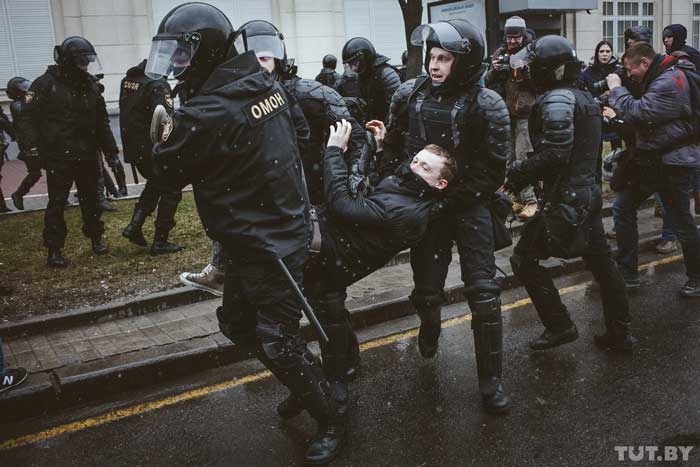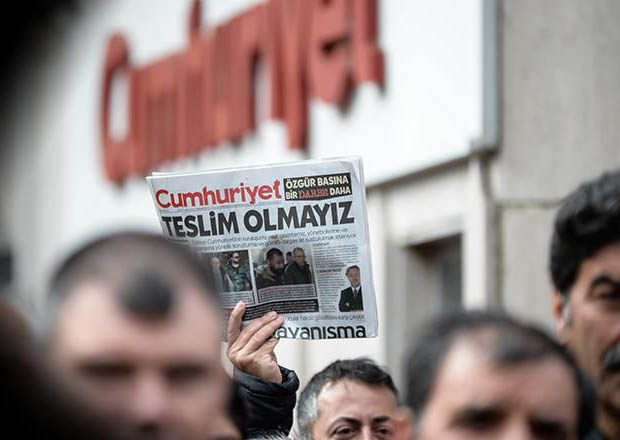27 Mar 2017 | Belarus, Campaigns, Campaigns -- Featured, Statements
[vc_row][vc_column][vc_column_text]

Belarusian police detain Belarus Free Theatre’s Siarhai Kvachonok on Saturday March 25 2017 during protests against Presidential Decree No 3, which imposes a tax on unemployed people. (Photo: Tut.by)
Index on Censorship condemns the continued crackdown on protesters in Europe’s last dictatorship.
Belarusian authorities detained about 400 people over the weekend as Freedom Day demonstrations against the country’s Presidential Decree No. 3, which imposes a tax on the unemployed. Protesters were met by riot police and many were reportedly assaulted.
“This is in clear violation of the right to freedom of expression and freedom of assembly. Index demands all detainees be immediately and unconditionally released and all charges be dropped,” Melody Patry, head of advocacy at Index on Censorship, said.
Among the detainees were international and domestic journalists, human rights defenders, and actors and playwrights working for the UK-based Belarus Free Theatre.
BFT staffer, Siarhai Kvachonok was sentenced to 10 days detention on Monday March 27 for his participation in the protest. Among his charges: “Using strong language, shouting and hooliganism”. Yana Rusakevich, another BFT member, was located in a hospital with a concussion on Sunday. On Saturday, BFT manager Svetlana Sugako was filmed being arrested by the BBC.
Artistic Director Natalia Kaliada of the BFT told The Guardian: “It’s a strategy of arrests and clearing the streets and blocking the internet that they think will spook people, but people are very angry. All these arrests and splitting up the crowds might make things a little quieter in Minsk, but now these protests are happening all over Belarus. This is the worst crackdown over the last seven years, but it would have been the biggest protest. People don’t care, they want an end to this dictator. They say ‘basta’ – enough.”[/vc_column_text][/vc_column][/vc_row][vc_row equal_height=”yes” el_class=”text_white” css=”.vc_custom_1490626863780{background-color: #dd3333 !important;background-position: center !important;background-repeat: no-repeat !important;background-size: cover !important;}”][vc_column width=”1/2″][vc_custom_heading text=”Belarus: Mass detentions of journalists at Freedom Day protests” font_container=”tag:p|font_size:28|text_align:left” use_theme_fonts=”yes” link=”url:https%3A%2F%2Fmappingmediafreedom.org%2F%23%2F3877|||”][vc_column_text]Mass detentions of journalists took place in three Belarusian cities during Freedom Day marches, according to the Belorussian Association of Journalists. Over 35 foreign and domestic journalists were detained. Read the full report on Mapping Media Freedom[/vc_column_text][/vc_column][vc_column width=”1/2″ css=”.vc_custom_1490627099721{background-image: url(https://www.indexoncensorship.org/wp-content/uploads/2017/02/MMF_report_2016_cover.jpg?id=85855) !important;background-position: center !important;background-repeat: no-repeat !important;background-size: cover !important;}”][/vc_column][/vc_row][vc_row][vc_column][vc_basic_grid post_type=”post” max_items=”4″ element_width=”6″ grid_id=”vc_gid:1490626915933-142b19eb-1c90-10″ taxonomies=”172, 7379, 301″][/vc_column][/vc_row]
23 Mar 2017 | Belarus, Campaigns, Campaigns -- Featured, Statements
Dear Mr. President
We, 48 undersigned organizations from 24 countries, strongly condemn the continuing wave of detentions and harassment of peaceful protesters, journalists, human rights defenders, civil society activists, anarchists and opposition party members in Belarus.
Most of the detentions and harassment are linked to participation in peaceful protests demanding the cancellation of Presidential Decree No. 3, the so-called “social parasite” legislation, which imposes a tax on unemployed people in Belarus. Decree No. 3 obligates citizens to work a specific number of days or pay a special duty to the State under threat of arrest. This is contrary to Art. 41 of the Belarusian Constitution and violates international human rights law.
According to reports from Belarusian and international human rights organizations, as of 22 March 2017 more than 250 people have been detained since 3 March 2017, including at least 31 journalists. At least 110 people have been sentenced to 3-15 days of administrative arrest. Many of them remain in detention, while others have been subject to different forms of harassment.
We strongly condemn the fact that several detentions of peaceful protesters at different places across Belarus have been carried out with the excessive use of force by Belarusian security officers.
Several Belarusian organizations have announced a demonstration that will take place in Minsk and in other cities in Belarus on 25 March 2017. We are deeply concerned about the physical and psychological integrity of the participants of these protest marches.
As the president of Belarus we urge you:
- to respect the right to peaceful assembly and expression
- to ensure that there are no obstructions to the exercising of these rights in Belarus, including in relation to the planned demonstration on 25 March 2017 in Minsk and in other cities across the country
- to guarantee in all circumstances the physical and psychological integrity of all peaceful protesters at the demonstration on 25 March 2017 in Minsk as well as at all other peaceful demonstrations across Belarus
- to refrain from the use of excessive force by security officers on 25 March 2017 in Minsk as well as at all other peaceful demonstrations across Belarus
- to ensure that journalists are able to fully exercise their professional duties, including during peaceful demonstrations
- to immediately and unconditionally release all protesters, journalists, human rights defenders, civil society activists and opposition members who have been detained in connection with the current wave of demonstrations solely for peacefully exercising their right to freedom of assembly and expression
- to refrain from preventively detaining journalists, human rights defenders, civil society activists, anarchists and opposition activists
- to immediately stop the persecution, harassment and intimidation of those who exercise their right to freedom of assembly, expression and association and ensure these rights to all Belarusian citizens
- to abolish Presidential Decree No. 3 since it violates international human rights law
Signatories:
Albanian Helsinki Committee
Analytical Center for Interethnic Cooperation and Consultations (Georgia)
Article 19 (UK)
Association UMDPL (Ukraine)
Bir Duino (Kyrgyzstan)
Bulgarian Helsinki Committee
Center for Civil Liberties (Ukraine)
Center for the Development of Democracy and Human Rights (Russia)
Charity foundation “East-SOS” (Ukraine)
Civic Belarus (Czech Republic)
CIVICUS: World Alliance for Citizen Participation, Johannesburg
Committee to Protect Journalists (USA)
Crude Accountability (USA)
FIDH, Paris
Freedom Files (Russia/Poland)
German-Russian Exchange (Germany)
Helsinki Committee for Human Rights in Serbia
Helsinki Committee of Armenia
Helsinki Foundation for Human Rights (Poland)
Human Rights Center “Postup” (Ukraine)
Human Rights Center (Azerbaijan)
Human Rights Information Center (Ukraine)
Human Rights Monitoring Institute (Lithuania)
Humanrights.ch (Switzerland)
Index on Censorship (UK)
Institute Respublica (Ukraine)
International Partnership for Human Rights (Belgium)
IRFS (Azerbaijan)
JEF Europe: Young European Federalists, Brussels
Kazakhstan Interantional Bureau for Human Rights and the Rule of Law
Kharkiv Human Rights Protection Group (Ukraine)
KRF Public Alternative (Ukraine)
Libereco – Partnership for Human Rights (Switzerland/Germany)
Macedonian Helsinki Committee
Memorial International, Moscow
Menschenrechte in Belarus e.V. (Germany)
Moscow Helsinki Group (Russia)
NESEHNUTI – Independent Social Ecological Movement (Czech Republic)
Norwegian Helsinki Committee
Ostgruppen – Swedish Initiative for Democracy and Human Rights
Promo LEX (Moldova)
Protection of Rights without Borders NGO (Armenia)
Public Verdict Foundation Russia)
Reporters Without Borders International, Paris
The Netherlands Helsinki Committee
The Swiss Helsinki Committee
Ukrainian Helsinki Human Rights Union
World Organisation Against Torture (OMCT), Geneva
31 Jan 2017 | Azerbaijan, Belarus, Europe and Central Asia, France, Mapping Media Freedom, News, Russia, Ukraine, United Kingdom
[vc_row][vc_column][vc_column_text]
Each week, Index on Censorship’s Mapping Media Freedom project verifies threats, violations and limitations faced by the media throughout the European Union and neighbouring countries. Here are five recent reports that give us cause for concern.
Police detained Aleksandra Ageyeva, a correspondent for the media outlet Sota Vision, at a mass demonstration near the Russian Constitutional Court building on 24 January.
According to Ageyeva, she was detained while filming the detainment of a demonstrator who was protesting against the imprisonment of opposition human rights activist Ildar Dadin.
Dadin is the first Russian citizen to be convicted for a “repeated violation” under a new law on mass rallies and meetings by peacefully protesters. He is currently serving a two-and-a-half year prison sentence and claims that his captors repeatedly abuses him.
A total of four protesters were detained along with Ageyeva at the scene. The police explained that the demonstrators were detained because they were supposedly jaywalking. Ageyeva spent around 11 hours in police custody.
The General Prosecutor’s Office of Belarus ruled to extradite Alexander Lapshin, a Russian-Israeli travel blogger to Azerbaijan, on 20 January.
On 15 December 2016 he was detained in Minsk on an extradition request from Azerbaijan, where he is wanted for visiting the disputed region of Nagorno-Karabakh and for criticising Azerbaijani policies.
A criminal case under two articles of the criminal code was filed in Azerbaijan which, if convicted, can lead to a prison sentence from five to eight years.
Lisa Giachino, editor-in-chief of the environmental magazine L’âge de faire, was arrested on 20 January at the border with Italy in the Roya valley, as she was following migrants for a story, news website Basta reported.
She is believed to have been kept in custody since 5am for “assisting migrants at the border,” and because she does not have a press card the police have refused to believe she is a journalist.
According to Nice Matin newspaper, Giachino was following six migrants for the story.
Giachino was later freed. She told Libération: “[Police officers] told me: ‘If we see you again with migrants, careful!’ It’s not normal to tell this to a journalist.”
Oleksiy Bobrovnikov, an investigative journalist and special correspondent for TSN programme on 1+1 TV channel, publicly wrote on his Facebook on 10 January that he left Ukraine after receiving numerous threats.
Since 2015 Bobrovnikov has been investigating the fatal shooting of officers and volunteers who oppose smuggling along what is known as the “grey zone,” the dividing line between western Ukraine and the self-proclaimed Donetsk and Luhansk People’s Republics.
Bobrovnikov confirmed to Mapping Media Freedom that he left the country in mid-December because he feared his life was in danger. He said he had received five warnings connected with his investigation telling him his life was in danger.
“The threats ranged from a pat on the shoulder to threats coming from people with weapons in their hands. Other people investigating trade with occupied territories also received similar threats,” Bobrovnikov wrote.
According to Ukrayinska Pravda, two individuals working to fight against the smuggling were killed on 2 September 2015, near Schastye, a town in the Luhansk region.
St Helens Council passed a motion on 18 January calling on retailers in the borough to stop selling daily newspaper The Sun, The St Helens Star reported.
The motion is not enforceable by law, but recommends retailers do not distribute the publication.
At the council meeting on Wednesday evening, Parr councillor Terry Shields asked the authority to support the Total Eclipse of The Sun campaign, which the paper’s controversial coverage of the Hillsborough disaster as a reason to boycott.
The campaign describes itself as a peaceful campaign group with more than 50,000 members.
Councillors approved the motion at the town hall. The three Conservative councillors abstained from the vote.
A spokeswoman says: “We have enjoyed great success now having over 240 establishments not selling the paper. This includes small newsagents, major supermarkets and petrol stations. Cafes, pubs, hotels and local hospitals, have also joined in, showing their support to the campaign.”[/vc_column_text][vc_column_text]
Click on the bubbles to view reports or double-click to zoom in on specific regions. The full site can be accessed at https://mappingmediafreedom.org/
[/vc_column_text][/vc_column][/vc_row][vc_row][vc_column][vc_basic_grid post_type=”post” max_items=”4″ element_width=”6″ grid_id=”vc_gid:1485518684846-d4098701-7bc7-6″ taxonomies=”6564″][/vc_column][/vc_row]
17 Nov 2016 | Mapping Media Freedom, News
[vc_row][vc_column][vc_column_text]Each week, Index on Censorship’s Mapping Media Freedom project verifies threats, violations and limitations faced by the media throughout the European Union and neighbouring countries. Here are five recent reports that give us cause for concern.

After passing a law issued by the interior ministry, Turkey has shut down and arrested members of approximately 370 independent organisations, including many media platforms.
A full list of these organisations is unavailable since the Turkish government claims some cases are still under investigation.
Since the state of emergency declared by Turkey this summer after the attempted military coup, the government has been shutting down media and civil organisations. Some of the organisations recently shut down have been the Dokuz8 News Site, Free Women’s Congress, the Kurdish Writers’ Association and the Fair Women’s Association.
Turkey has declared that all these independent organisations are allegedly linked to terror groups.
One organisation to fall victim to Turkey’s crackdown was the Cumhuriyet Foundation, a secular, liberal media platform. Nine journalists for Cumhuriyet, as well as the president of the executive board, Akın Atalay, were arrested within the past several weeks. They were charged with terrorism, the government saying that although the journalists were not official members of the terrorist group they engaged in activities for the organisation.
The arrest of the Cumhuriyet journalists raises the number of jailed journalists to 144.
Les Jours journalist, Olivier Bertrand, was working in Gaziantep to collect stories about post-coup Turkey. While there, Bertrand was detained by police with no reason given. On Sunday, French Foreign Minister Jean-Marc Ayrault demanded that Bertrand be set free.
Bertrand was released by Turkish authorities and deported back to France.
Freelance journalists Kastus Zhukouski and Aleksei Atroshchanka were working for Belsat TV in Svetlahorsk. While attempting to film trees being cut down by authorities, the two journalists were approached by police, who demanded to see their credentials.
After their IDs were initially checked, a police major who identified himself as Vyazhevich, approached and demanded to see the journalists’ credentials.
Zhukouski and Atroshchanka told the major that they had just shown their IDs and saw no reason so show them again.
Zhukouski told Belsat.eu that, the “major began to shake– his reaction was strange. He began to yell at us, asking if we have accreditation? We said that the right to freely spread information is guaranteed by the Constitution of Belarus. Major said we had to go to the police station. We did not resist. In the station he behaved inappropriately: grabbed the camera, my arm, pushed me, insulted me, and tried to provoke me in every way. I wrote a complaint about such actions of the police…”
After being held in the police station for three hours and having their belongings searched, the journalists were released.
Dennis Schouten, a journalist for PowNed was assaulted at a Rotterdam protest against the children’s character, Black Pete, who is part of the yearly celebration of Saint Nicholas. The character is supposed to be Saint Nicholas’ servant and is usually portrayed by a white person in blackface. The protesters were arguing the portrayal is racist.
While interviewing a protester, Schouten was pushed in front of a moving car. The reporter received no injuries.
The perpetrator was arrested by police at the scene.
Novaya Gazeta correspondent Dmitry Rebrov and a film crew for TV Rain were detained while covering truck driver protests in Moscow.
The demonstrators were protesting the “Plato” system, which charges the drivers tolls on federal highways.
Police detained the journalists when arresting the protesters. [/vc_column_text][/vc_column][/vc_row][vc_row][vc_column][vc_column_text]
Click on the bubbles to view reports or double-click to zoom in on specific regions. The full site can be accessed at https://mappingmediafreedom.org/
[/vc_column_text][/vc_column][/vc_row][vc_row][vc_column][vc_basic_grid post_type=”post” max_items=”4″ element_width=”6″ grid_id=”vc_gid:1479460802604-326201e9-0959-9″ taxonomies=”6564″][/vc_column][/vc_row]



